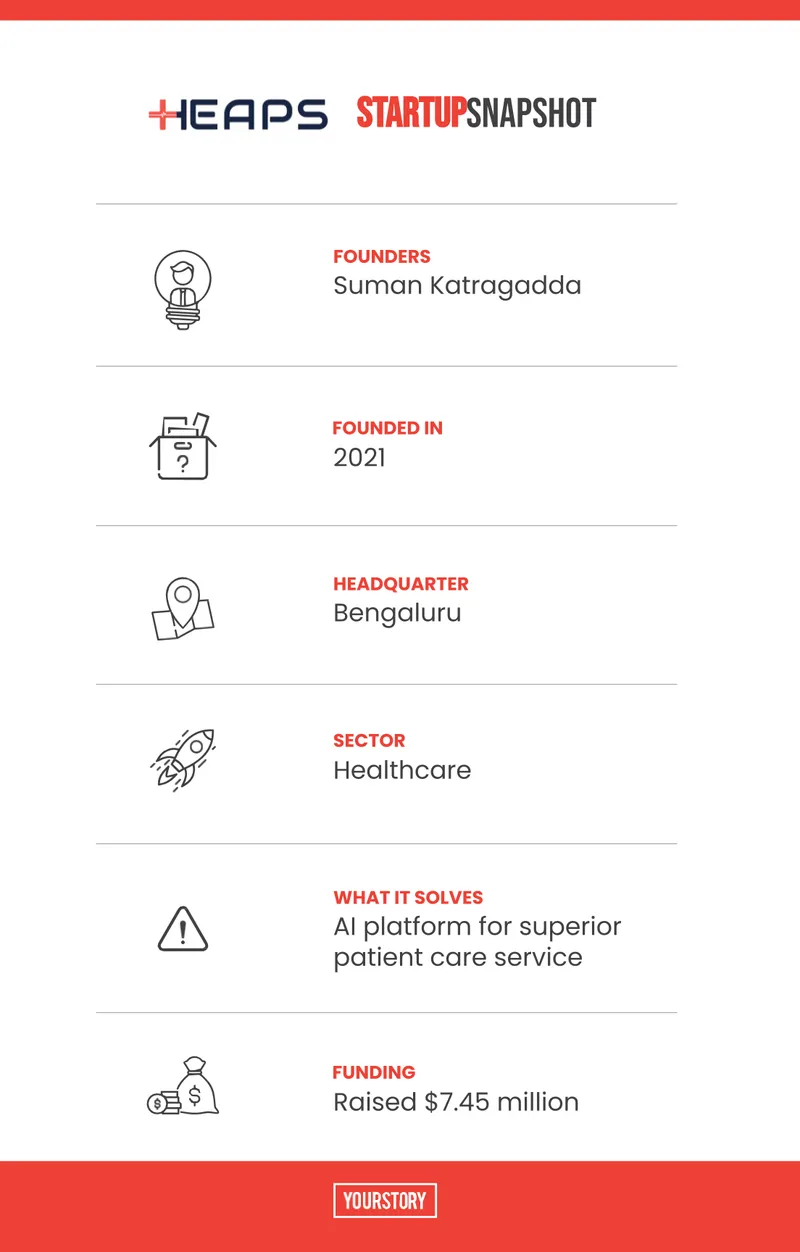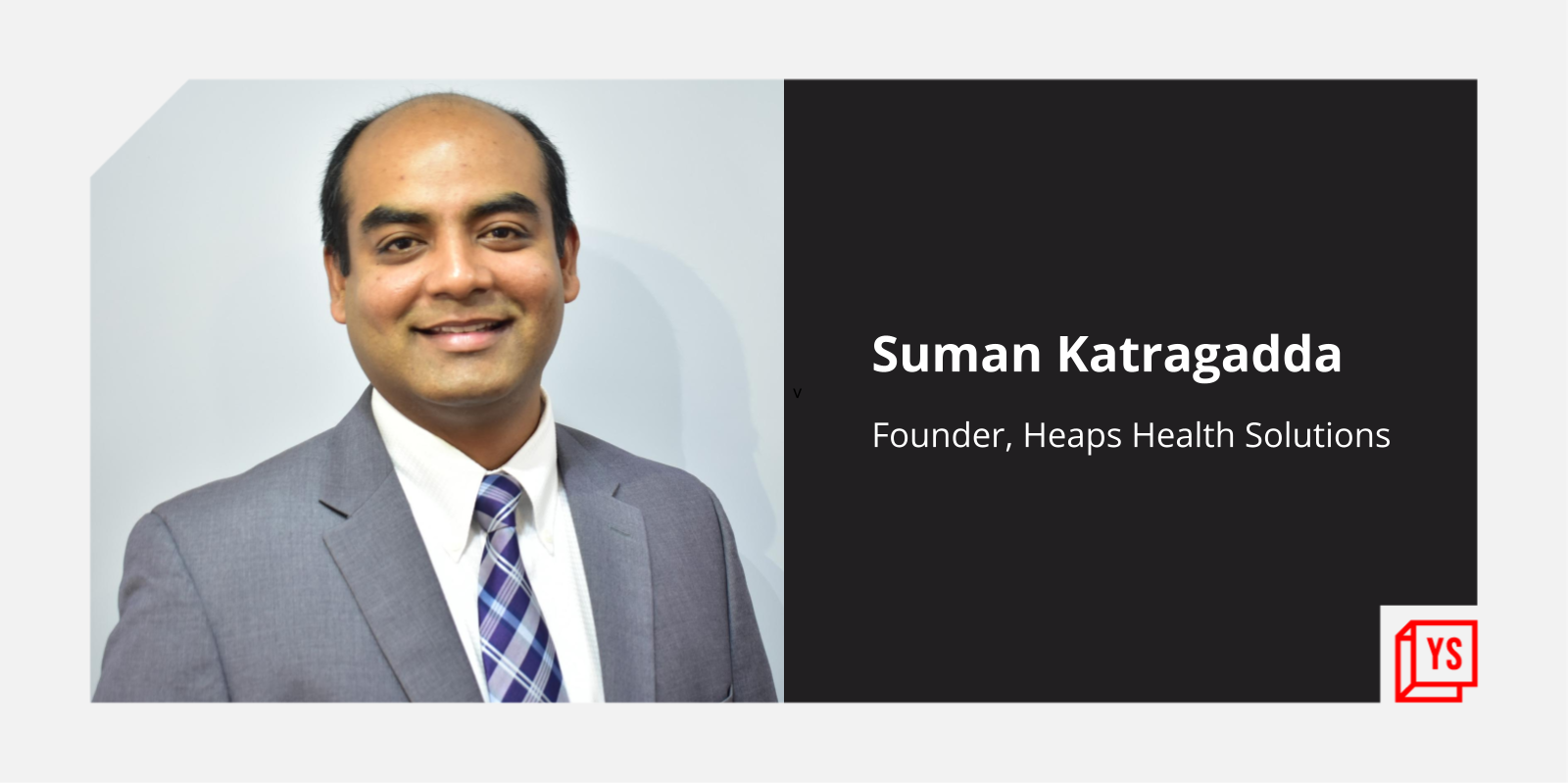This healthtech startup wants to redefine patient care management
Heaps Health's AI platform generates data-led insights, which proves beneficial to both hospitals and insurers to provide superior patient services without being burdened by the high cost.
Technology consulting professional Suman Katragadda on a visit to India had to be hospitalised due to a severe kidney stone condition which was treated but experienced certain side effects once discharged from the hospital. On enquiring with the doctor for the cause and remedy, he was told just to drink more water.
This experience led Suman to think about how the entire healthcare industry was operating and realised that three main constituencies - patients, hospitals and insurance companies were operating in silos with regard to data without much interaction creating numerous challenges.
These challenges included higher medical bills for patients, insurance companies paying out more claims, hospitals unable to fully utilise their infrastructure or losing patients, avoidable hospitalisation etc.

Given Suman’s background as a technologist with experience working with consulting firm PwC, he felt artificial intelligence (AI) could be leveraged to develop a platform which brings all three constituencies together to enable greater transparency and higher efficiency.
This led to the founding of Health Solutions in 2021 by Suman with its headquarters in Bengaluru and was started in a bootstrapped manner.
Operating in silos
In the healthcare industry, each of the constituencies has its own set of challenges. For the health insurance companies, they have to always watch out for any high proportion of claims ratio from the patients where the thumb rule is that anything above 85 percent of their total corpus results in a loss.
For the hospitals, it is always the question of how they can build continuous engagement with their set of patients to create a base of loyal customers otherwise they would move to the competition.
Suman says, “If there is loyalty it will always result in higher revenue.”
The founder of Heaps Health believes engagement by the hospitals with its patients falls on four vectors - education, awareness, self-management and proactive assessment. This can actually help in early detection or raising the red flag on any health issue.
The key parameters which determine the success of any hospital are its experience, cost, mortality and infection rates.
Lastly, for the patients, they would look at places where there is superior service at optimum cost. According to Suman, around 30 per cent of the hospitalisation of patients is avoidable.
As each of them has data of their own, there is no interaction between the three which potentially leads to lower efficiency in treating the patient.
Unified platform
Heaps Health Solutions has now created an AI-driven tech solution which brings all these three constituencies on a single platform where this startup provides actionable insights based on the data it collects.
Suman says, “Hospitals need more patients while insurance companies need lesser claims and we need to strike a fine balance.”
The creation of this platform was a labour of many years, where Heaps went through voluminous amounts of data with a trial and error method.
The healthtech platform of Heaps works on the goal that there is the optimisation of the cost without compromising on quality and it is a win:win for everybody.

Under the model of Heaps, it has created a value-based care model with the aim that the quality of care is not compromised while the cost of care is optimised. In this framework, Heaps engages only with the high performer hospitals and the insurance companies can negotiate with them on the rates rather than following a fixed price model.
“We want the insurance companies to come into the hospital to negotiate on a value based care system where they get incentive for a good outcome,” says Suman.
Heaps Health Solutions provides the insights to all its partners to help them make the right decision.
Suman claims its platform enables personalised care for patients as it has various insights from the data to ask very pointed questions about their health status.
An example, in this case, accurate diagnosis can lead to lower hospitalisation which is beneficial for the insurance company while in the case of severity, it is advantageous for the hospital as the cost of treating such diseases is high.
Growth
Heaps Health Solutions has around 45 hospitals on its platform and two insurance companies. Another 8-10 insurance companies are likely to be added soon. The plan is also to get more corporates on this platform.
The entire tech platform of Heaps Health Solutions is governed by the highest forms of data security.
According to a report by Markets and Markets, the global healthcare IT market is expected to reach $821.1 billion by 2026 from the level of $326.1 billion in 2021.
Heaps provides its tech platform on a SaaS model, where it provides its solution either through a licensing model or a total outsourcing agreement. It generates revenues based on the license fee.
In the month of January this year, it raised $7.45 million in a Series A round of funding from NVS Wealth Managers and Rajiv Dadlani Group.
As part of its future plans, this healthtech startup aims to have around 300 hospitals and 16 insurance companies under its network. Besides, it is also looking to get into other markets such as the US and South East Asia.
Suman believes there is no direct competition for them as other similar platforms in the market are either focused on hospitals or insurance companies but nobody has bought all the three together.
Edited by Kanishk Singh













